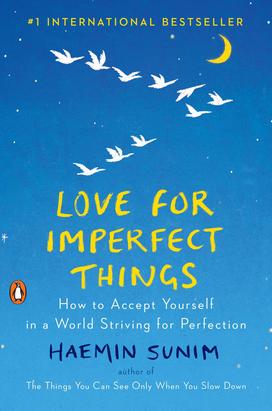Haemin Sunim *07 on Love and Imperfection

Each of the eight chapters are centered around ways to practice loving the imperfect. The chapters are introduced by Sunim’s narrative reflections on aspects of love, setting the stage for a succession of short thematic poems and aphorisms.
The author: Haemin Sunim *07 was born in South Korea, and came to the United States to study film, only to then be pulled into the spiritual life. He received formal monastic training in Korea and taught Buddhism at Hampshire College in Amherst, Mass. His Zen Buddhist writings have been published in more than 30 languages, and he has more than a million followers on Twitter.
Opening lines: There are times in life when we encounter a film that stays with us for a very long time. For me, A River Runs Through It is one such film. Set in the first half of the twentieth century, and with the beautiful scenery of Montana for a backdrop, it tells the story of the Maclean family, for whom fishing is just as important as religion. The father is a Presbyterian minister with two sons. The elder son, Norman, lives a respectable life and becomes a university professor. The younger son, Paul, comes to lead a life of debauchery while working as a journalist for a local paper; his gambling habit gets him into great debt, and in the end he is beaten to death in an alley. The father, consumed by his deep sense of loss, speaks to his congregation during Sunday service with restrained emotion, revealing his love for his second son. “We can love completely,” he says, “even without complete understanding.”
It was difficult for the father to understand why his son Paul had to live a life of dissipation. However, this didn’t stop him from loving his son—because, to him, love transcends human understanding. Rather than loving someone only when you feel you understand what it is you love, the kinds of deep, enduring love shown by the father does not cease even when the loved one behaves in a way you do not agree with. In the depths of the heart, love is always flowing, like a river.
When we examine our lives, we see many imperfect things, like motes of dust on an old mirror. There are all kinds of things that leave us feeling dissatisfied and unhappy: Our words are often different from our actions, our relationships are strained by our mistakes, our best-laid plans for the future go awry. On top of that, in the course of our lives we inflict various wounds on others, intentionally or unintentionally, causing us to feel guilt and regret.
But it’s the same when we look at our family and friends. The child who doesn’t listen to what his parents tell him; your own parents who do not understand you; your spouse who doesn’t behave reasonably. Close friends with bad health habits make you worry about their well-being. Every morning when we watch the news unfold, we see that the world is filled with yet more fighting, more accidents, more discord. It seems as though it will never end.
And yet, even though we find many such imperfect things in the world we live in, we cannot help but love them. Because our lives are far too precious to be spent in ridicule and hatred of what doesn’t appeal to use, of what we do not understand. As we become more spiritually mature, we naturally develop more empathy and try to see things from others’ perspectives. This, in turn, teaches us to accept the imperfections of others, and of ourselves, in a more graceful and compassionate way, like a mother loves her child no matter what.
Reviews: “Haemin Sunim is the real deal. The simplicity and beauty of his teachings go straight to the heart. Keep this book close by—it will awaken wisdom and deepen your love of life.” -Tara Brach, bestselling author of Radical Acceptance and True Refuge












No responses yet